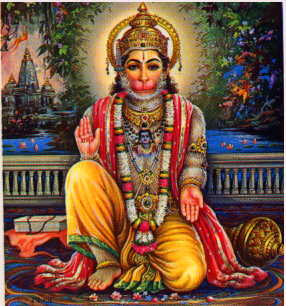
Dashratha: His Three Wives And Children
''Dashratha signifies the chariot of the human body consisting often senses.
He has three wives, viz., Kaushalya, K-aikeyi and Sumitra who represent Satwic,
Rajasic and Tamasic qualities, respectively. These three wives had four
children, viz., Rama, Lakshmana, Bharata, Shatrughana who represent the Rig,
Yajur, Sama and Atharvana Veda, respectively. Ivau-ilial^ v»-as highly
virtuous and even-m'nded. Likewise, Sumitra too was pure-hearted, and as her
name indicates she was good friend of everybody (Sumitra). Her ideals were
unparalled. When Rama, before going to exile, went to seek the blessings of
mother Kaushalya, she lamented saying, 'My son! I can't live without you for a
moment.' Then Sumitra consoled her. 'Dear sister. God Himself has taken birth
as your son Rama. He can never be farther from anybody. But, He has to act
according to the time, place and circumstances. Do not feel sad that he is
going away from you. He will come back very soon.' What was Sumitra's advice
to her son Lakshmana when he came to seek her blessings before going to the
forest? She told him, 'My son! Do not be under the impression that you are
going to the forest. Ayodhya is wherever Rama is. Without Sita and Rama, this
Ayodhya is but forest. Sita is your mother, Rama is your father. Serve them
with love. That is your primary duty.' She advised her son Shatrughana to
serve Bharata." Sai Baba, SS. 5/2000, p. 132
Symbolism
Of Dasharatha
"You would have heard the name of Dasharatha. Who is he? He is not the king of
Ayodhya. Dasharatha refers to one who has control over the human body that has
got five senses of perception and five senses of action. The master of these ten
senses is Dasharatha. This body is a chariot and Dasharatha is the master of
this chariot. He had three wives. They signify Satwic, Rajasic and Tamasic
qualities. He had four sons. They signify the four objectives of life: Dharma,
Artha, Kama and Moksha. What is the capital of Dasharatha's kingdom? 'Ayodhya',
which means it is a place where no one can get into. It signifies 'Hridaya',
where no wdcked qualities can enter. Atma symbolizes 'Hridaya' (spiritual
heart). God dwells in Hridaya. Hridaya is the centre of love and peace." Sai
Baba, SS, 11-12/98. p.
Idealism Of Bharata
"If you consider the conduct of Bharata, you find that even though the kingdom
was offered to him by his father and mother, he did not desire to enjoy what
belonged by right to the eldest son, Rama. He considered it immoral and
opposed to the traditions of the Ikshvaku family to accept the kingdom in such
circumstances and firmly renounced it.
Bharata not only refused to ascend the throne, but he took a vow to stay out
of the capital (Ayodhya) till Rama returned to the kingdom. He declared he was
not prepared to tarnish the good name of his great ancestors for the sake of
the throne. 'When Rama has gone to the forest to honour his father's command,
I shall also go to the forest', said Bharata. Ultimately he secured the
sandals of Rama, installed them on the throne and himself led the life of an
ascetic in Nandigrama, a village outside the capital. Is it conceivable that
anyone would give up a great good fortune came his way in the manner Bharata
did? Will anyone spurn the windfall that comes to him? But, Bharata did not
regard the kingdom as a blessing. He felt that it would be infamous to succeed
to the throne." Sai Baba. SS, 4/91, p. 89
Idealism Of Rama's Mother, Kaushalya
"How did Kaushalya bless Rama when he prostrated before her prior to leaving
for the forest? She declared: 'May that Dharma, for protecting of which you
are going to the forest, protect you always!' May you have for your protection
all the amulets, which Gouri (Parvati) and other great mothers gave to their
sons when they went out to fight the forces of evil.' Thus, Rama received the
blessings of his mother, step-mother and all others when he set out for the
forest to honour his father's word." Sai Baba. SS. 4/91. p. 90
Idealism
Of Lakshamana's Mother Sumitra
"Lakshmana's mother, Sumitra, when her son fell at her feet and sought her
blessings before leaving for the forest with Rama and Sita, rejoiced in giving
him her blessings. She told him: 'The forest where Rama is will be Ayodhya for
you. Will any mother send her son to the forest in this manner?" Sai Baba.
SS, 4/91, p. 90
